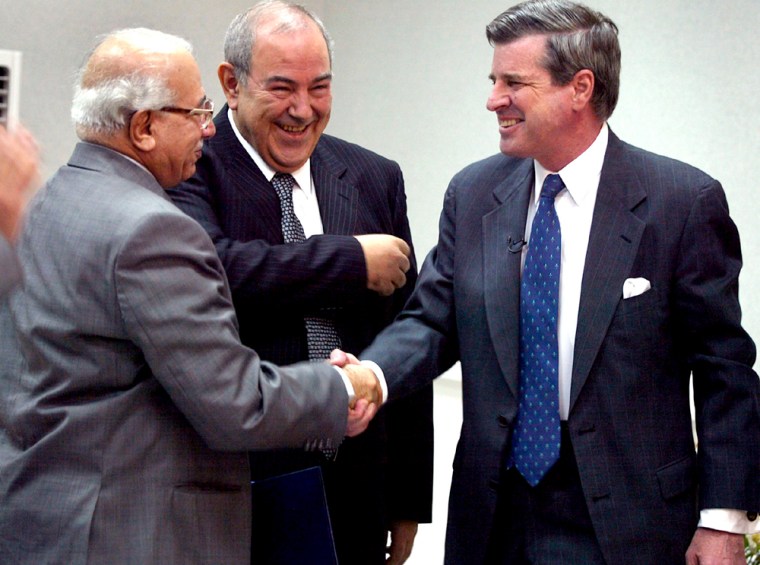For America’s diplomats, the long-awaited handover is a major step toward putting an Iraqi face on the postwar occupation.
But the biggest challenge will be sharing the burden of ushering in a new democratic era in Iraq with the new leaders as well as with international allies.
A crucial step in the strategy of building up the new government was replacing Coalition Provisional Authority leader Paul Bremer — who has operated as a "proconsul" in charge of everything military and civilian — with a much less visible U.S. ambassador, the first in Iraq in 13 years.
Sworn in by Secretary of State Colin Powell last week, John Negroponte will have a very different style.
State Department control?
In advance of the war, the State Department jockeyed — unsuccessfully — for control of the postwar occupation and argued that the violence would be far greater than anticipated.
The diplomats were correct, of course, and now have the challenging job of fixing the mess.
In fact, with Monday’s unexpectedly speedy transition to an Iraqi government, the State Department will finally assume operational control over reconstruction aid, logjammed during months of Pentagon management.
That responsibility, on the ground, will fall to Negroponte.
Unlike Bremer, the former U.S. ambassador to the United Nations is not likely to parade around the country giving orders or speaking for the military.
Instead, he will work behind the scenes, parceling out rare interviews and functioning as a more traditional diplomat. Think of him more as “Mr. Inside” vs. Bremer’s “Mr. Outside.”
Iraq will be Negroponte’s fifth assignment as a chief of mission; his diplomatic credentials stretch back to the Eisenhower administration.
From his years during the Vietnam War as Henry Kissinger’s aide at the secret Paris peace talks to his even more controversial years as ambassador to Honduras during the illegal U.S. war against the “contras,” Negroponte has had a rare talent for showing up where the action is — an experienced, behind-the-scenes facilitator widely respected in capitals around the world.
He also has a uniquely personal relationship with his boss, the secretary of state. He and Powell have worked together for years, most notably at the National Security Council in the second Reagan administration.
There was no mistaking Powell’s sincere affection for Negroponte and his family at the swearing-in ceremony, a strong signal to American diplomats that Iraq is the State Department’s top priority.
Security still key
But security issues will still dictate critical choices, so that even the enormous new U.S. Embassy in Iraq will, in many ways, have to answer to military decision-makers.
Even more complex than the uneasy partnership between the Pentagon and State Department will be the evolving relationship with Iraq’s new interim leaders.
Those who emerged from a messy process were not the first choices of the Americans, or the United Nations, for that matter.
And they will be challenged internally by clever competitors like Ahmed Chalabi, the exile leader now being investigated for possible collaboration with Iran but still defended by powerful Pentagon leaders like Deputy Defense Secretary Paul Wolfowitz and Richard Perle, an associate of Defense Secretary Donald Rumsfeld.
Assuming Chalabi and other factional leaders can be controlled, Iraq’s new government must still try to create a secure enough environment to hold elections next winter. None of this will be easy.
And it’s far from clear that Washington will get much help from the Europeans in effecting a transition to an Iraqi government. Hours after the change in sovereignty, NATO agreed to help train Iraq’s armed forces, an offer that fell short of Washington’s hopes for a larger role for the alliance in the country.
The State Department brags of a coalition of 32 members with troops in Iraq. But on closer inspection, many of those countries — Denmark, the Dominican Republic, El Salvador — are not major players.
Many NATO allies are not willing to join a war they opposed or help the United States extricate itself from the chaos of Iraq.
Meantime, the United Nations is still immobilized by the security threat after losing some of its most valuable future leaders in last August’s bombing of the U.N. headquarters in Baghdad,
Secretary-General Kofi Annan is reluctant to permit his people to return. So they remain in the Jordanian capital, Amman, at least 12 hours removed from Baghdad.
Operating through contractors in Iraq, the United Nations is trying to distribute $200 million on the ground through education programs and UNICEF efforts to purify the water supply. And the United Nations is now training teams of Iraqis in Mexico on how to hold real elections.
The payoff?
The diplomatic payoff for the United States would be if both NATO and the United Nations helped fill the vacuum of power by training indigenous security forces and creating the framework for credible elections.
Ideally, that would permit the United States to gradually cede power to Iraqis, and, it is hoped, become less targeted by opponents of the occupation.
But despite what the sovereignty documents now say, Iraq is still an American show.
For as long as the United States remains obligated to secure Iraq, it will get the responsibility — and the blame — for its progress toward self-governance, if not democracy.
